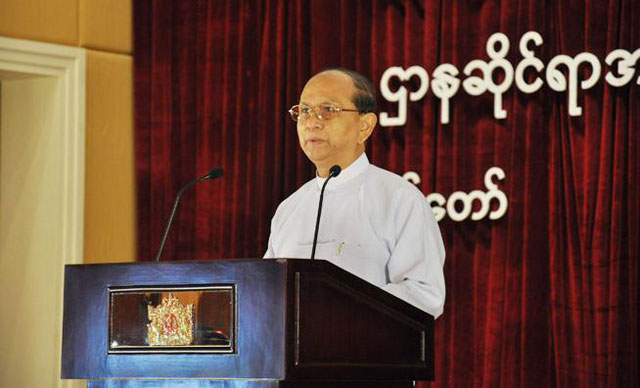“A second wave of reforms” – largely financial and economic– are beginning in Burma, President Thein Sein said on Tuesday in a nationwide televised speech.
 The reforms would concentrate on financial and economic changes in a country that for decades has ranked near the bottom in economic statistics. The newly elected government is rushing to put through legislative changes after western nations lifted or eased sanctions in the past month.
The reforms would concentrate on financial and economic changes in a country that for decades has ranked near the bottom in economic statistics. The newly elected government is rushing to put through legislative changes after western nations lifted or eased sanctions in the past month.
A new investment law is expected to be passed in the upcoming session of Parliament, which opens in July. The reforms will also include less government involvement in some key sector areas, he said.
“In the first year of power, the national government has been speedily working on political reforms and national reconciliation,” Thein Sein said in the televised address.
“From this year onwards, we are working on a second wave of reforms which will focus especially on the development of the country and the public.”
“On the other hand, we will continue to work on national reconciliation, national peace and stability and the rule of law, and the safety of the public,” he said.
Thein Sein, a former general who took office 15 months ago after the military handed over power to his quasi-civilian government, said the government would reduce its control in some key industries, including telecommunications, electricity, energy, forestry, education, health and “financial matters.”
“The privatization that is in the second wave of government reforms does not mean we are going to break them up and sell them,” he said.
He said the government aimed to triple GDP per capita by fiscal year 2015/16, and there was a need for more foreign help in terms of aid and expertise to boost the economy.
“If you observe developing nations, the government's budget alone is not sufficient to achieve their development goals ... that alleviate poverty and require international grants, aid, loans and technical expertise,” he said.
On June 10, Thein Sein addressed the nation regarding the sectarian violence in Arakan State, which he said threatened the transition to democracy if it spread further, and announced a state of emergency in the affected area.
Thein Sein spoke after three days of violence in the state between Buddhists and Muslims.
Extra troops had already been flown to the area after rampaging mobs had killed people with machetes, sticks and knives.
"If we put racial and religious issues at the forefront, if we put the never-ending hatred, desire for revenge and anarchic actions at the forefront, and if we continue to retaliate and terrorize and kill each other, there's a danger that [the unrest] could multiply and move beyond Rakhine," Thein Sein said. "If this happens, the general public should be aware that the country's stability and peace, democratization process and development, which are only in transition right now, could be severely affected and much would be lost."
The president said the government would compensate those who had suffered losses, and he asked people to be magnanimous and understanding.
State media reported last week that at least 50 people were killed in the violence more than 2,000 homes and businesses were burned


